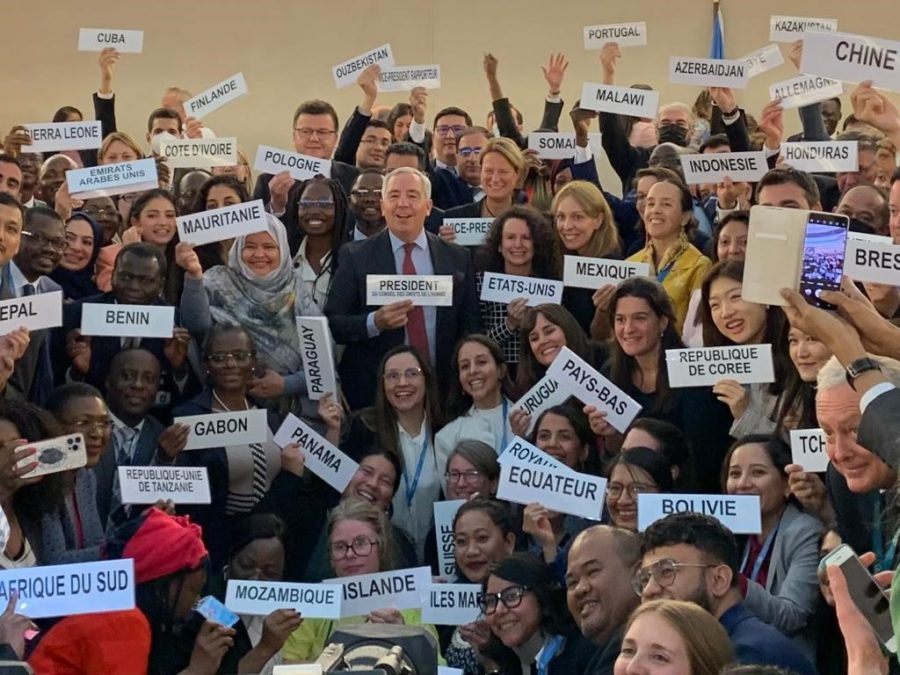I’ve always had a fond attachment to the number 51. It was my house number growing up in Manchester, as little Robert. My first memory there was my parents bringing my newly-born baby sister home from the hospital. And my mum was born in the year ’51 (as well as some more famous but less important people). It is also the 6th Motzkin number, telling the number of ways to draw non-intersecting chords between any six points on a circle’s boundary, no matter where the points may be located on the boundary. But I’ve no idea what that means.
For anyone who was there, Human Rights Council session 51 will forever be seared into their memory banks. It was monumental and threw some long held beliefs about the Council out of the window. The prevailing orthodoxy in these parts had been that formal scrutiny of the most powerful countries was off limits, no matter how bad their human rights records. Despite Article One of the Universal Declaration of Human Rights’ affirmation that “All human beings are born free and equal in dignity and rights”, when it came to looking at the most serious human rights violations, some countries had always seemed more equal than others.
This was a particularly bad session for Russia. Although the Council had responded to Russia’s violations of international law in Georgia, Syria, and Ukraine, until now Russia’s economic influence had served to protect it against examination of its dire domestic human rights record. Not anymore. Luxembourg admirably led a group of countries that created a new Special Rapporteur to monitor the domestic repression that has accompanied and enabled international aggression. The resolution was adopted the same day that Memorial – the highly respected NGO forced to close by Putin’s Russia, was announced as one of the co-winners of the Nobel Peace Prize -a double whammy, on Putin’s 70th birthday. More poignantly it was also the 16th anniversary of the assassination of renowned human rights defender and journalist Anna Politkovskya. Her legacy of courage and dedication to exposing the truth continues to endure.
The biggest showdown of all was on China. In her final act before stepping down in August, former High Commissioner Michelle Bachelet released her Office’s long awaited report on Xinjiang. It set out with rigour and in harrowing detail, the massive extent of China’s violations against Uyghur Muslims and other minorities. What it describes is the biggest mass detention based on religion or ethnicity since the atrocities of the Second World War. While many countries including the UK have been raising concerns for several years, the report provided independent and objective findings from a UN body, despite China’s attempts to block its publication. Among the strongest conclusions was that the extent of arbitrary and discriminatory detention of members of Uyghur and other predominantly Muslim groups, may constitute crimes against humanity.
I am proud that the UK was among 10 countries, led by the US, which sought to put China’s violations in Xinjiang on the Council’s agenda, through seeking a formal debate. As expected, China spared no effort in opposing holding a debate, and ultimately narrowly succeeded when this came to a vote. But even having this vote at the Council was a huge step forward. Just 3 years ago only 23 countries were willing to sign a joint letter about Xinjiang. And such was the concern about retribution, that none of those 23 were willing to be identified as the overall lead and read out a Council statement. We have come a long way. Many colleagues told me that whichever way their country ended up voting, they personally agreed that it was right to bring this issue to the Council. It had made everyone aware of the violations documented by the UN, and had ensured that that China’s behaviour had not escaped scrutiny. Of course the numbers matter at the Human Rights Council, but sometimes it is not all about winning the vote.
Throughout the session, the Swiss railways did their best to drive me insane through sleep deprivation. Night after night there was mind-melting noise from nocturnal repair works on the train tracks, outside my bedroom window. It got me thinking about the notorious incident last football season when Everton fans spent the whole night before a crucial match against Chelsea, outside the Chelsea players’ hotel, making an enormous din, setting off fireworks and generally keeping them from sleeping as best they could. Perhaps the Beijing and Moscow branches of the Everton supporters’ club fed back some handy tips to higher powers.
Alongside Russia and China, there were important and impressive outcomes on Afghanistan, Sri Lanka, Venezuela, Burundi, Ethiopia, Somalia and more. Much needed monitoring or reporting will continue on each of these countries and in any other session the success of these resolutions would have got much more attention.
The Council closed on an extremely emotional note. Sam, the much-admired Chargé d’Affaires from the Marshall Islands, introduced a resolution focused on technical assistance to his country to address the human rights implications of the legacy of nuclear testing. His powerful statement set out how the people of the Marshall Islands continue to suffer from huge levels of cancer, and the Council chamber was visibly moved by his words. Our deepest condolences go out to his Ambassador for her own recent personal loss from cancer.
It’s hard to say if this will be it for the year. Since the session closed, the situation in Iran has deteriorated rapidly from a terrible starting point, while Russia’s wickedness in Ukraine seems to know no bounds, with repeated attacks on civilian targets. But that’s certainly it for the current session at least. It’s going to take anyone who was there a bit of time to recover and I hope we won’t be seeing each other again too soon. The Council did a lot of growing up at number 51. Though it still has some way to go.

